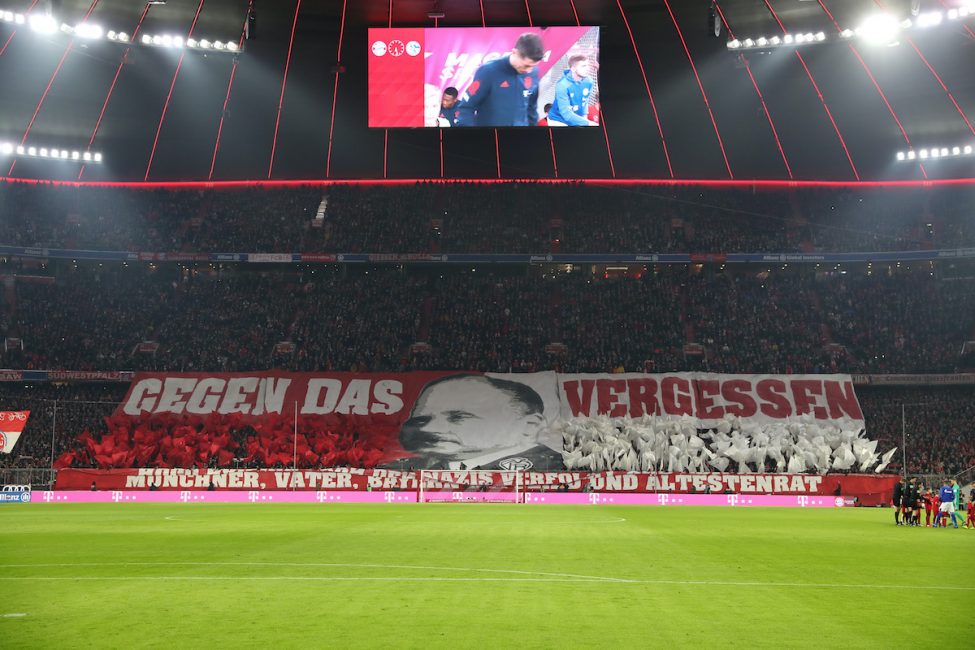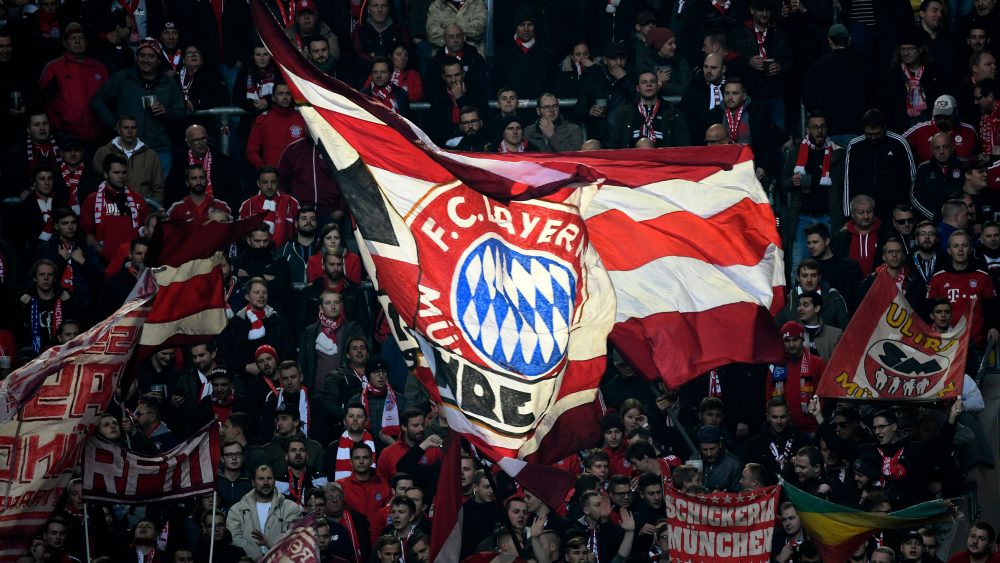DFB-Pokal quarter-finals Preview: Schalke against Bayern
Bayern was already leading 6-0 when some of their fans almost caused the game to be abandoned. Since then, hardly anyone has talked about the performance Hansi Flick’s team had delivered during the first 60 minutes of the match. The actions a lot of fans in several Bundesliga stadiums took have been too important and far-reaching, even though the game was another, albeit small, milestone in Flick’s still young career as Bayern’s head coach.
Even the draw between RB Leipzig and Leverkusen a day later that allowed Bayern to extend their lead in the standings to three points hardly played a role in any discussion of the weekend’s events. As things stand, Bayern can afford to lose one game more than Leipzig, which could become a vital advantage considering both teams’ remaining fixtures. Bayern still has to play away to such sides as Union Berlin, Borussia Dortmund and Leverkusen. And then there is the home game against Gladbach and not to forget all the other minor stumbling blocks along the way. Leipzig’s final run-in, on the other hand, in the main sees them face opposition from the lower half of the table. Their most difficult tasks will arguably be the away games at Wolfsburg and Hoffenheim as well as the home games against Dortmund and Freiburg.
Back to focusing on football? Not quite yet.
Despite the matchday’s good news for FC Bayern, the events of the weekend cannot be easily brushed aside. What happened there was not the beginning of an escalation. It was the final stage of an escalation of a conflict that has been going on for years, with all sides increasingly adopting radical positions.
For one, there is the DFB, which did not live up to its role as a mediator. Then there is a faction of supporters who, in the specific case of FC Bayern, have drifted further and further towards extreme positions, because they felt misunderstood. And finally there is FC Bayern itself, who have failed to establish a strategically wise platform for discussion and mutual exchange with their supporters
There is no uniform entity “the Ultras”. By making this generalization, the problems already start. The Ultras, who have to be be regarded as a youth movement of the 21st century even though they do not consist exclusively of young people, are too heterogeneous a group for that. Their members come from a broad variety of backgrounds, with everything from people from socially difficult circumstances to well-off people being represented in these groups – with all the positive and negative aspects that go with this.
Power struggle instead of dialogue?
This also means that there are people who would be perfectly able to communicate with those responsible at FC Bayern and the DFB on an equal footing. However, as we were told by a well-connected fan in the “Südkurve” (FC Bayern’s Ultra block), the club has not done enough to establish a dialogue with these people in recent years.
Instead, the positions on both sides have become increasingly entrenched. The interests of all sides moved into the background against a scene of events that saw all long simmering conflicts escalating last weekend. The most obvious route the DFB could now be tempted to take to “solve” the problem is clear: to issue a collective punishment on all Bayern supporters by barring them from attending future away games at Hoffenheim. This, however, could release a potential for further escalation among organized supporters throughout the country on an unprecedented scale.
As soon as Bayern’s match at Schalke tonight, the Veltins Arena could become the next stage in this power struggle. Although Schalke announced that they would abandon the match at the very first incident, it will be interesting to see what both sets of supporters have in mind this time.
Confrontation will not help
There seems to be no way back for all parties involved. The fronts are too hardened, too great would be the concessions that either side would have to make. In fact, experience should tell FC Bayern that confrontation and collective punishments cannot be the solution.
In 2008, an attempt was made to prevent the “Schickeria” (Bayern’s largest Ultra group) from visiting the stadium by using a season ticket list that was created during the earlier move to the Allianz Arena, on which every member of the Schickeria could sign up. The problem was that you did not have to be a member of the Schickeria to sign up. As a result, along with Schickeria members a number of other fans were excluded incidentally, even though there was no intent and basis to exclude them. Fans were punished who had absolutely nothing to do with the causes that lead to this culling in the first place.
A few years later the experiment with “terror expert” Wolfgang Salewski totally went pear shaped. It was only when the club began to engage in more direct dialogue with the fans that the relationship relaxed a little. Now the mutual relationship is back to the elevated confrontation levels of previous times. Karl-Heinz Rummenigge distanced himself so clearly from the supporters that there is no longer any room for manoeuvre.
The fans want to be heard
Without question, this is the fault of those who chose a radical strategy for their justified criticism, even though they knew that the DFB would react harder after the events of the past week(s). And yet FC Bayern must ask itself whether it really wants to follow this course now. Or whether, instead of distancing itself and setting up a commission that works against rather than with the fans, it would not be more sensible to strengthen those within the fan curve who are prepared for constructive dialogue and have proven this on several occasions in the past.
FC Bayern has missed such a process in recent years, which has also made the mediating role of Club No 12 increasingly clearer, according to the fans we interviewed. According to them, more radical voices have become louder and louder within the curve, because they have managed to convince others that the club would not hear them anyway. In addition, the conviction has grown that the moderate course would lead nowhere. In fact, the club has broken promises and left the compromising fans in the rain.
And that is precisely why it is important that the Bavarians finally put a stop to this creeping process by taking the interests of the fan groups seriously and intensively. Not dialogue for the sake of dialogue, but dialogue for constructive exchange. This also includes sending representatives of the club to events at which fan topics can be discussed critically. This winter, fans organized a discussion on Qatar in cooperation with the Rosa Luxemburg Foundation and the Kurt-Eisner Club in Munich. An employee of the club was requested, but the Bavarians decided to avoid the event and put the cloak of silence over it. Is this an appropriate way to deal with fan topics? Success will be achieved not by collective punishment and distancing, but through targeted, strategically astute dialogue.
Otherwise, the club risks further radicalisation, which will be impossible to control in the long run. People who call for the exclusion of entire Ultras’ fan groups at least do not seem to understand the significance of these groups for the Bundesliga, football and the entire culture associated with it. Especially in Germany, the country that boasts of its full stadiums and outstanding atmosphere. Atmosphere, as past protests have shown, which would not be possible without the well-organised fan scenes. Cases of racism and discrimination are also extremely rare in the curves – especially in comparison to countries like Italy.
The fan groups are crucial in the fight against discrimination
The Schickeria, so hated by many, even received the “Julius Hirsch Prize” of the DFB in 2014 for its fight against discrimination and anti-Semitism. They created the Kurt-Landauer Foundation and the annual Kurt-Landauer Tournament. They also constantly remind people of the importance of the Jewish President of Bayern and the still necessary fight against anti-Semitism and racism. The Südkurve is very diverse and also has room for the fan club “Queerpass Bayern”.

(Photo: Christian Kaspar-Bartke/Bongarts/Getty Images)
Is this now to be the big justification speech for the incidents of the weekend and other banners like the one that Dorothee Bär recently “released for shooting”? Absolutely not. It is hard to beat in terms of bad taste, and the bear banner in particular deserves much more reaction than the one from last weekend. But all this underlines the heterogeneity within a fan curve and that a collective loss of today’s fan scene could also lead to a loss of the so important culture of remembrance around FC Bayern and a loss of strength in the important fight against discrimination and racism. Or, to give the DFB and the DFL a more tangible argument for them: it could lead to the loss of the trademark of German football. Namely, the oh-so-great fan culture within the stadiums, which distinguishes the Bundesliga from England, for example. For now.
The current course of all parties will inevitably lead to a situation where an elementary component of football culture will be pushed back at some point. The coming months will show how much this multi-layered culture with all its positive aspects, which it undoubtedly has despite its negative sides, is still worth to FC Bayern (and the DFB).
Football is secondary on Tuesday evening
But in order to keep the last hope for improvement, the reasonable voices on both sides would have to come closer again, sit down at the table and seriously consider what a compromise might look like in the future. With the stubbornness suggested by some statements of the involved Südkurve groups as well as the statements of those responsible, everything will end in chaos, the result of which cannot be a desirable goal.
Either way, the game at Schalke will be pushed into the background. Meticulous attention will be paid to how all sides deal with the situation. The outstanding form of FC Bayern is therefore only secondary. For the Bavarian fan scene, the Schalke game could be a decisive marker for the path now taken. Will the aggressive, radical course be continued? Or will we take the moderate path again now that the attention is there and express criticism within the framework of reason? The DFB’s handling of the situation also remains interesting. As we have already written elsewhere, the current path could lead to a never-ending series of match abandonments. Escalation instead of de-escalation.
A rapprochement of all parties involved and the abandonment of radical and sometimes exaggerated positions would be desirable. Just as the “Our Curve” interest group is demanding. This is where the associations are particularly called upon. But the fear remains that radicalisation is likely to go even further. The trenches that have been dug by all those involved are too deep. The situation into which they have gotten themselves seems too hopeless. And so it is difficult, in view of the threatening consequences for German football as a whole, to take a sporting look at this match this Tuesday evening. Although the challenge for the Bavarians will be an exciting one, especially with the absence of Jérôme Boateng and Lucas Hernández. That is, if the game is not abandoned.





